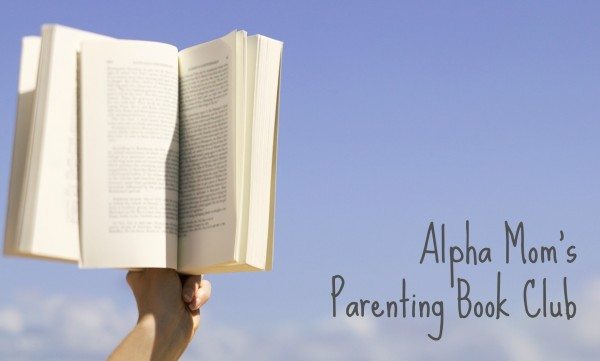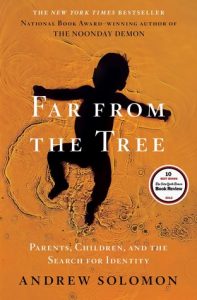
Alpha Mom Parenting Book Club: Far From the Tree

I don’t even know where to begin discussing this book, Far From the Tree. I could talk about it for hours, and in fact I have, mostly to people who haven’t read it, but are definitely going to read the book now just so I will shut-up about it. I really enjoyed this book. When it arrived in the mail I will admit that I was slightly intimidated by the sheer size–so many words to read! I felt a little like my fourth grader who judges all books by the number of pages and size of the font. This book= lots of pages, small font.

Very early on I was struck by this passage from the book, “Though many of us take pride in how different we are from our parents, we are endlessly sad at how different our children are from us.” (pg 2)
I grew up as an only child. I hated it for many reasons and probably gave it more weight than it should have had for the sadness I experienced as a child. I knew beyond a doubt that I would have many children when I was an adult (um, I have seven now). I said many times to my parents that I would never have just one child. It probably was hurtful, but I never even considered that. It was just one of those things. Recently, one of my children offhandedly said that when he grows up he is only going to have one child so that his one child will know he is the most special person of all and he can give his child every thing he wants. I hate to admit that it hurt when he said that. I felt that I was being judged and not measuring up to his ideals of what a parent should be. I had given him what I longed for most in life, siblings, and it wasn’t enough. It was in that moment, as I turned my emotions over in my head, that I realized what I want from life is not necessarily what he wants from life and that those differences don’t have to be an indication that either one is inferior. His not wanting (maybe) to have many children does not reflect negatively on the choices I have made. And while typing this out it seems so obvious, I think we get caught up in emotions that mask that. His choices are for him, my choices are for me.
In his exhaustive book, Andrew Solomon discusses in different chapters what it is like to raise children who are deaf, dwarfs, prodigies, criminals, transgendered, or are born of rape, have disabilities such as down syndrome, autism, schizophrenia, or multiple disabilities. He weaves his own story as a homosexual male growing up during a time period when it was believed that one could be “cured” of it, ultimately realizing that his parents loved him the best way that they could, with the knowledge and skills that they had at the time.
Each chapter of Far From the Tree seemed enough for a stand alone book. There were times when I thought he dragged on a little, but more often I wanted even more information, which says a lot about the book when it is already closing in on 1000 pages.
I read the first two chapters in order and after that I skipped around. The last chapter I read was the one about transgender children and so it is still rattling around in my head. Parents second guessing what they are doing with their children, wondering if they are causing more harm than good for their children, the judgement of other people– all of these things are magnified in the situations that Solomon describes, but they are all feelings that most of us as parents have felt. There couldn’t be a way for a child to fall farther from the tree, to use Solomon’s anaolgy, than to feel like they are in the body of the wrong sex.
Because Far From the Tree was so immense I don’t even know where to start discussing it. So I thought I would throw out some quotes that I highlighted and we can start discussing there. I’d love to know what parts of the book resonated with you the most. I know I can’t be the only one who reads books with a pencil and sticky notes in hand.
1: This quote struck me, in the chapter on prodigies. One of the mothers is talking about the criticism she has received about her son having no other extra curricular activities. “In America, every kid has to be well rounded. They have ten different activities, and they never excel at any of them. Americans want everyone to have the same life; it’s the cult of average.” (pg 453) I see this in my own life, friends who have their children in every activity imaginable, with no down time to discover what they are truly passionate about. And on the other hand I hear criticism about parents who allow their child to focus on one activity they really like.
2: “To look deep into your child’s eyes and see in him both yourself and something utterly strange, and then to develop a zealous attachment to every aspect of him, is to achieve parenthood’s self-regarding, yet unselfish, abandon. It is astonishing how often such mutuality had been realized – how frequently parents who had supposed that they couldn’t care for an exceptional child discover that they can. The parental predisposition to love prevails in the most harrowing of circumstances. There is more imagination in the world than one might think.” I’m not sure I have ever heard parenting described more eloquently.
3: “The philosopher Sophia Isako Wong, whose brother has Down’s Syndrome, asked, “What makes life as a parent worth living-or, in other words, what rewards do parents expect in return for the sacrifices they make in raising children?” (page 365) I have heard people say many times they have “sacrificed” their lives for their children. I have never framed my parenting in those terms, but I have also not really given up anything solely for my children either. But I think it is an interesting question to ponder, what do we get out of being parents?
4: When Solomon is interviewing the father of one profoundly disabled child, the father says, “By the dependency that one child has, I’ve learned a lot about the independence of the other kids. The girls can do whatever the hell they want and I’ll be proud of them. It’s very freeing.” (page 370) I have said similar things about the benefit of being a latter born child in a large family, I have jokingly said that no one really cares what the youngest child does, as long as he stays out of jail and is a decent human being. That is freeing, for the child and parent.
I wish that we could all sit around in person with our giant books on our laps and snacks at hand and just talk about the book. Every story fascinated me–from the pillow angels, the parents who filed the wrongful-life suit after their very premature baby was kept alive by heroic measures against their expressed wishes, the dwarfs who had limb lengthening surgery, the Deaf culture, the adults with schizophrenia and the parents who mourn for the lives they could have had.
And maybe that is what stuck with me, the thread throughout the book. As parents we have ideas of where children should go, the path they could take, and in some instances that path is changed by circumstances beyond anyone’s control and in others our children simply decide to go in a different direction. “Most of us believe that our children are the children we had to have; we could have had no others. They will never seem to us happenstance; we love them because they are our destiny. Even when they are flawed, do wrong, hurt us, die–even then, they are a part of the rightness by which we measure our own lives. Indeed they are the rightness by which we measure life itself, and they bring us to life as profoundly as we do them.” (page 698)
So tell me what impressed you in Far From the Tree? Were there any parts that you felt resonated with you and your own situation, even if you don’t have children that fit into the categories described in the chapters?

